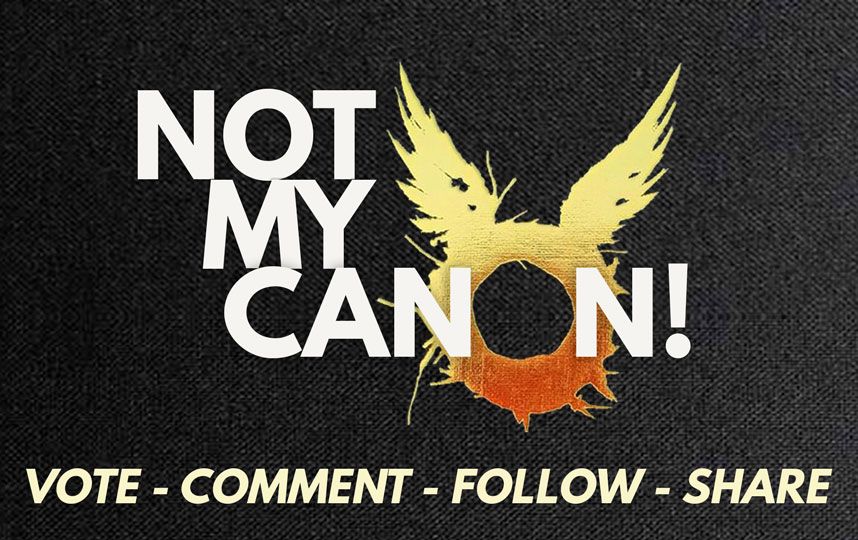WTF: Show, Don't Tell
Just days ago, I posted part of a recent interview with JKR and Co. and ended with this quote:
PHILLIPS: It wasn't as if you had any doubts as to whether you could write? I think the jury's come in on that one.
ROWLING: Yeah, but it's a different genre though, isn't it? You're an arrogant person if you assume that because you can do one thing, you can do everything. And I'm not that person.
And then I added this gif:

First and foremost, I absolutely love that this book has become a discussion that we are all a part of, influenced by comments and differing viewpoints. Coincidentally, a comment by @FangTheBoarhound threaded nicely into the direction I was heading, but I think I could have easily written entire posts based on something from each and every one of you. I'm grateful to have such awesome fans and you guys are pushing me so hard to give you the absolute best I can offer with this retrospective and analysis (and with my edit of Fred and George, which is coming along nicely).
Here's that comment:
"I think Cursed Child struggles to understand whether it's a book meant for the general public to read, or if it's a script meant for actors to read, study, memorize, and perform. The Cursed Trio seem to not be able to stop themselves from telling us what characters are feeling and how they're responding to things. This is fine if it's a book. We need that information if that's the case. But if it's a play, then it's the actor's job to interpret and add meaning. These annoying little directions setting the emotional context are out of place in either case. If it's a script, get rid of them. They don't belong (and neither do we as readers in that case!). And if it's a book, we would obviously be getting more explanation, in which case these small things they've thrown in come across as condescending and controlling. Don't *tell* me how they feel -- *show* me. Make it obvious in the writing. But clearly, CC does not know what it is, and so then anything it tries to be, it fails at."
I, alone, can write it
I've already covered why the play doesn't know what it is (not a mystery, Harry is a minor character, 8th story, etcetera), but it seems that indistinction can also be said of the script itself.
This critique is not foreign to J.K. Rowling. In fact, the only other time she stepped away from novel writing was the screenplay for Fantastic Beasts (which I enjoyed), and the general consensus from critics was that the movie didn't understand it was not a book.
See, many movies are screenplays adapted from popular novels, which means they are typically written by someone other than the author. Different insights can be discovered when someone else is steering the ship. They can find a seamless narrative thread that feels succinct enough for the screen, in a way that leaves unnecessary elements of the story on the cutting room floor - elements that would otherwise have been difficult to dismiss for the originator of that concept. In the case of Fantastic Beasts, JKR had total carte blanche to do whatever she liked. That was part of her deal.
If you want me... I, alone, can write it.
Her attitude, when it came to Cursed Child, was to hire a playwright to do the "heavy lifting". This was something she didn't consider for Fantastic Beasts and the flaws revealed themselves naturally when it attempted to tell a novel-length story in a two-hour timespan.
I'm the hero
JKR is a very famous, very rich, individual. But I don't care how many books you've written or how much money you have in the bank, each one of us is created with a giant character flaw: we will always see ourselves as the hero of our own story. This means that our personal perspective tends to seem like the right one. That's why it helps to have people in your life who are willing to show you the error of your ways.
Fantastic Beasts and Cursed Child both suffer from the same problem - that the Queen can do no wrong. In both instances, JKR needed people who would be tough on her. Someone who would say, "Hey, I think you need to shop this script around. Something is off and the whole thing might be better served by having another set of eyes."
Don't hit send!
We all need that friend, right? The one we trust enough to grab hold of our phone before we tap 'send' on that text, because we always overlook the one word that would have *insert some extreme fate here.
I think the script would have benefited greatly from such a critique. Cursed Child doesn't know what it is. It's not a novel, and yet it wants to be the 8th story, conceptualized and overseen by a famous book writer who is likely quite unaware that the novelist's lexicon has no place in a play script.
Yes, FangTheBoarhound is right. The book of a play should be intentionally vague when it comes to perceived emotion or suggested atmosphere because that is an overstep. It dictates interpretation for future directors. That's why you'll always find new versions of the same plays by William Shakespeare. A different set of eyes can tell a different story using the same words and characters. The medium of the stage play is remarkable *for* that reason, not in spite of it. The freedom of actor interpretation translates to the all-important glory of the retelling.
The dreaded adverb
I don't necessarily know if I can do this for the MOD. Were I to start over from scratch, I would tell a small story that could have the ability to be interpreted differently, with little to no stage direction. Also, I am not trying to sell copies of it to people who have never read a script before (and we need lots of sales, so make it extra authory!!!). This play is such an immense story, they call it "epic", that it relies on some of these authorial tactics to the point of codependency. As someone who has studied JKR's writing style in order to duplicate it for my fanfiction, I can tell you that she is a big fan of adverbs. Adverbs are those 'ly' words that end up being the first thing your writing teacher will cross out with a red pen. Why? Because adverbs are an example of telling your audience instead of showing them. And if there is one thing that can be said about plays, it's that theater is the one medium that relies heavily on the audience expecting the story to be shown to them and not told. My first example of "show, don't tell" highlights this very fact.
Example 1: Mercilessly.
And suddenly HARRY appears from nowhere beside ALBUS as steam expands all over the stage. We're back on platform nine and three-quarters and time has ticked on mercilessly. ALBUS is now a year older (as is HARRY, but less noticeably).
Example 2: Blue skies smiling at me
SNAPE is pulled hard to the ground and then pushed high into the air as his soul is ripped from him. As the screams just seem to multiply. The doe turns to him with beautiful eyes, and disappears. There is a bang and a flash. And then silence. And then there's more silence. It's so still, it's so peaceful, it's so perfectly tranquil. And then - SCORPIUS ascends to the surface. Breathing deeply. He looks around himself. Breathing deep, panicked breaths. He looks up at the sky. The sky certainly seems - bluer than before. And then ALBUS ascends after him. There's a silence. SCORPIUS just looks at ALBUS, disbelieving. Both boys breathe in and out.
Why is the text describing how the character THINKS that the sky seems bluer than it did before...? This is a stage play. We can have the character look off and ponder things. The audience doesn't need to envision that this character sees the sky looking bluer. That's the kind of thing an actor puts into the role as motivation. This *clap* doesn't *clap* belong *clap* in the *clap* medium! It's way too literary. Be a play or don't. But you need to pick a lane.
Example 3: Besties! Understand?
DELPHI puts her hand in the air. ALBUS grins and points at her. These two are getting on really well now.
Example 4: In case you missed it...
We open on DELPHI, enjoying every second of her changed identity. Where there was discomfort and insecurity, now there's just power.
Example 5: Oh, okay. I just thought he was being rude.
CEDRIC walks confidently away. ALBUS looks after him - desperate to say something, unsure what to say.
There are many more examples, but this post is already long. So, I'll end on one of my absolute favorites.
Example 6: In hell? We wouldn't have known otherwise! This is...titanic!
CRAIG BOWKER JR.: What's happening?
DELPHI: Avada Kedavra!
DELPHI sends a blast of green light across the stage - CRAIG is propelled backwards by it - and is immediately killed.
There's a silence. A silence that seems to last for a long time.
Did you not understand? These are not childish games we are playing here. You are useful to me, your friends are not.
ALBUS and SCORPIUS look at CRAIG's body - their minds in hell.

Bạn đang đọc truyện trên: Truyen247.Pro